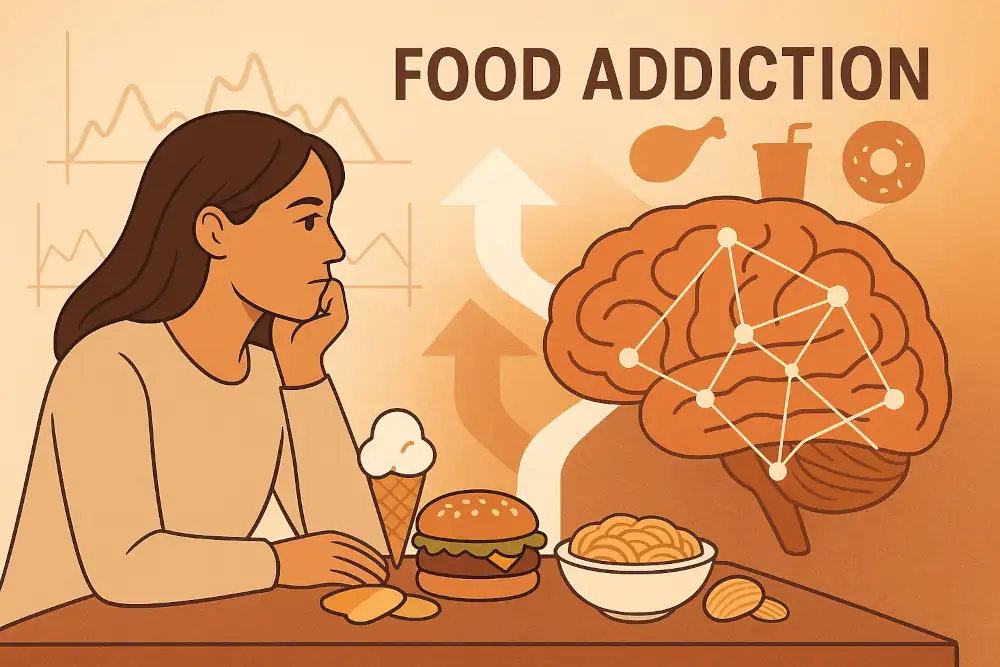Is Food Addiction Real? Just in Time for Thanksgiving!

Food Addiction: The “Addiction” We All Talk About
Many of us have joked about being “addicted” to ice cream or chips, describing an intense craving that feels impossible to resist. This common experience is at the heart of a serious scientific debate: Is Food Addiction (FA) a genuine addiction, similar to substance addiction?
The conversation has grown more complex as modern definitions of addiction have expanded.
Influential bodies like the American Society of Addiction Medicine no longer require the ingestion of a psychoactive substance for something to be considered an addiction. Similarly, behavioral addictions like gambling disorder are now formally recognized. This has intensified the scientific inquiry into whether addictive-like eating fits the same mold.
To find answers, a recent longitudinal study looked at the role of emotion regulation, how we handle our feelings, to compare food addiction and substance misuse.
The findings were surprising, revealing critical differences in the emotional pathways that drive these behaviors. This article breaks down the three most impactful takeaways that challenge what we think we know about food addiction.
1. The Counter-Intuitive Role of Positive Emotions in Food Addiction
Takeaway 1: Acting on a Good Mood Predicts Substance Misuse, But Deters Food Addiction.
One of the study’s most unexpected findings relates to “positive urgency.” It’s described as a psychological trait. One defined as the tendency to act impulsively when experiencing strong positive emotions, like feeling overjoyed or extremely happy.
The research, which tracked women over six months, found a striking divergence.
A one-unit increase in a person’s positive urgency score was associated with:
- A 100% to 200% increase in the odds of future alcohol or drug-related problems.
- A 50% decrease in the odds of future food addiction.
Why would feeling good lead to such different outcomes?
The researchers suggest it comes down to the reinforcing power of the substance or behavior.
Individuals high in positive urgency may seek to amplify or extend their good feelings, and psychoactive substances are far more effective at this than food.
The study’s authors explain: Women with greater positive urgency may tend to select psychoactive substances such as alcohol or drugs that can more effectively amplify or prolong their positive feelings, rather than food. Food’s effects are less potent and thus less reinforcing than psychoactive substances.
This discovery is significant because it highlights a fundamental difference in the emotional triggers for food addiction versus substance misuse.
While a good mood might increase the risk for substance misuse, it appears to have the opposite effect on addictive-like eating.

Licensed Professional Counselors, do you need continuing education hours?
Look no further!
If you find this article interesting, Dr. Weeks’ course Sexual Education and Porn Use in Women, and her other unique courses, will engage and educate!
2. How We Judge Our Feelings Matter… But Differently
Takeaway 2: Not Accepting Your Negative Emotions Has Opposite Effects on Food Addiction vs. Alcohol-Related Problems
Another key aspect of emotion regulation is the “non-acceptance of one’s negative emotions.”
This is the tendency to have self-critical or judgmental reactions like shame, guilt, or frustration to your own distressing feelings.
Here again, the study found that this trait was linked to food addiction and alcohol-related problems in opposite ways:
- Non-acceptance was associated with more severe food addiction symptoms.
- Non-acceptance was associated with less severe alcohol-related problems.
The researchers hypothesize that this difference may be rooted in social stigma.
Women who feel ashamed of their negative emotions might turn to food as a coping mechanism because overeating is often viewed as less stigmatized than alcohol misuse.
The study references other research showing that the label “food addict” is perceived as less shameful than “substance or alcohol addiction.” This suggests that societal norms and the fear of judgment can profoundly shape which coping behaviors we adopt.
3. The Complicated Truth About Negative Moods and Food Addiction
Takeaway 3: The Link Between Bad Moods and Bingeing Isn’t a Simple One
The idea that we eat to soothe bad feelings, often called “emotional eating,” is a popular one. This is related to the concept of “negative urgency,” or the tendency to act impulsively when experiencing strong negative emotions.
At first glance, the study’s data seemed to support this common belief.
When looking at a single point in time, the researchers found that negative urgency was a common link between both food addiction and substance misuse.
However, when they analyzed the data over time in a more sophisticated multivariate model, the picture changed dramatically.
After controlling for other emotion-regulation factors, negative urgency was not a significant predictor of future food addiction or substance misuse problems.
This doesn’t mean bad moods are irrelevant.
Rather, it suggests that negative urgency might be a “fellow traveler.” It’s present alongside the true driver, but not in the driver’s seat itself.
When the researchers statistically controlled for the powerful effect of positive urgency, the predictive signal from negative urgency faded away. This finding challenges the simple narrative that “feeling bad leads to addiction” and reveals that, over the long term, other emotional factors are far more influential.
Conclusion: A Different Kind of Struggle
While food addiction and substance addiction share surface-level similarities like cravings and loss of control, this new research paints a picture of two surprisingly different psychological profiles.
One is characterized by impulsivity in good times, which predicts substance misuse, while the other is marked by self-judgment in bad times, which predicts addictive-like eating.
This challenges the one-size-fits-all model of addiction.
The study’s overall conclusion is clear: “These findings suggest that FA [Food Addiction] is not associated with the same key deficits in emotion regulation as SA [Substance Addiction].”
This leaves us with a critical question to consider:
If the emotional drivers for food addiction and substance addiction are so different, does this mean we need to rethink how we talk about, prevent, and treat addictive-like eating?

Are you exploring your trauma? Do you feel your childhood experiences were detrimental to your current mental or physical health? Utilize this free, validated, self-report questionnaire to find out.
Are you a professional looking to stay up-to-date with the latest information on, sex addiction, trauma, and mental health news and research? Or maybe you’re looking for continuing education courses?
Stay up-to-date with all of Dr. Jen’s work through her practice’s newsletter!


Have you found yourself in legal trouble due to your sexual behavior? Seek assistance before the court mandates it, with Sexual Addiction Treatment Services.
Are you looking for more reputable, data-backed information on sexual addiction? The Mitigation Aide Research Archive is an excellent source for executive summaries of research studies.

